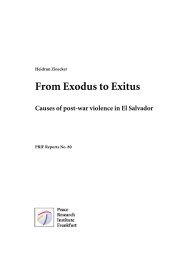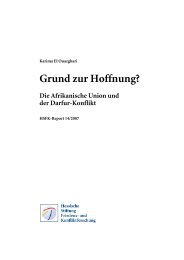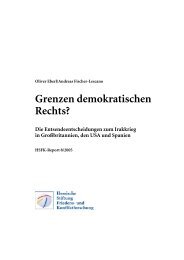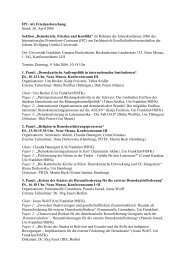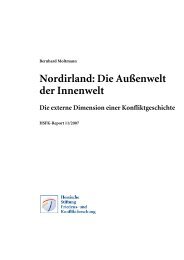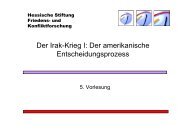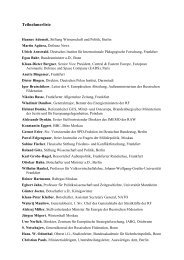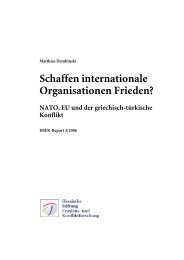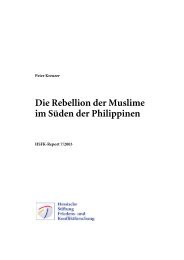The Normative Construction of the Military in Lithuania - HSFK
The Normative Construction of the Military in Lithuania - HSFK
The Normative Construction of the Military in Lithuania - HSFK
Create successful ePaper yourself
Turn your PDF publications into a flip-book with our unique Google optimized e-Paper software.
M<strong>in</strong>iotaite: <strong>Lithuania</strong>n Case I/14-2007<br />
even contributed to <strong>in</strong>ternal division with<strong>in</strong> <strong>the</strong> society and thus helped create an air <strong>of</strong><br />
legitimacy for Soviet actions. <strong>The</strong> <strong>in</strong>vasion <strong>of</strong> <strong>the</strong> Red army <strong>in</strong>to <strong>Lithuania</strong> <strong>in</strong> June 1940<br />
was <strong>the</strong> death toll to <strong>the</strong> <strong>Lithuania</strong>n armed forces. <strong>The</strong> liquidation and destruction <strong>of</strong> <strong>the</strong><br />
<strong>Lithuania</strong>n military preceded by arrest<strong>in</strong>g and send<strong>in</strong>g about 2000 <strong>of</strong>ficers and 4.5<br />
thousand soldiers to Soviet concentration camps where most <strong>of</strong> <strong>the</strong>m were killed or died<br />
because <strong>of</strong> unbearable conditions. 18 A part <strong>of</strong> <strong>the</strong> military was <strong>in</strong>corporated <strong>in</strong>to <strong>the</strong><br />
Soviet army.<br />
<strong>The</strong> fact that <strong>Lithuania</strong>’s military, so much extolled dur<strong>in</strong>g <strong>the</strong> whole period <strong>of</strong><br />
<strong>Lithuania</strong>’s <strong>in</strong>dependence, at a critical jo<strong>in</strong>t for <strong>the</strong> state’s dest<strong>in</strong>y obeyed <strong>the</strong> order <strong>of</strong> <strong>the</strong><br />
civil government not to resist foreign <strong>in</strong>vasion is now considered <strong>in</strong> <strong>Lithuania</strong> as an<br />
historical blunder. <strong>The</strong> resolve not to repeat it f<strong>in</strong>ds its reflection <strong>in</strong> most strategic<br />
documents <strong>of</strong> <strong>the</strong> reemerged <strong>Lithuania</strong>n state. <strong>The</strong> lost dignity <strong>of</strong> <strong>Lithuania</strong>’s military has<br />
been partly recuperated by acknowledg<strong>in</strong>g <strong>the</strong> valor <strong>of</strong> its soldiers and <strong>of</strong>ficers <strong>in</strong> <strong>the</strong><br />
guerilla fight aga<strong>in</strong>st <strong>the</strong> Soviets <strong>in</strong> 1944-1954. 19<br />
2. Conceptualization <strong>of</strong> Defense and <strong>the</strong> <strong>Military</strong> <strong>in</strong> <strong>the</strong> Second<br />
Republic: 1990-<br />
<strong>Lithuania</strong> was <strong>the</strong> first republic <strong>of</strong> <strong>the</strong> former Soviet Union to declare its<br />
<strong>in</strong>dependence. On 11 March 1990 a mere 1.5 percent <strong>of</strong> <strong>the</strong> Soviet population <strong>in</strong>habit<strong>in</strong>g<br />
only 0.3 percent <strong>of</strong> Soviet territory posed a fundamental challenge to <strong>the</strong> vast empire and<br />
its powerful apparatus <strong>of</strong> repression. <strong>The</strong> world saw <strong>the</strong> challenge, though at first with<br />
little formal engagement yet with plenty <strong>of</strong> (if at times condescend<strong>in</strong>g) sympathy. Only<br />
after <strong>the</strong> bloody events <strong>of</strong> January 1991 <strong>in</strong> <strong>Lithuania</strong> and <strong>the</strong> failed Moscow putsch <strong>in</strong><br />
August 1991 did <strong>Lithuania</strong> receive widespread <strong>in</strong>ternational recognition 20 . On 17<br />
September 1991 <strong>Lithuania</strong> was granted membership <strong>in</strong> <strong>the</strong> United Nations.<br />
Though becom<strong>in</strong>g an actor <strong>of</strong> <strong>in</strong>ternational politics, <strong>Lithuania</strong> still had to do its<br />
state-build<strong>in</strong>g under very complicated circumstances. Like o<strong>the</strong>r post-communist states<br />
<strong>Lithuania</strong> had to implement “a triple transition <strong>in</strong> which it was attempt<strong>in</strong>g simultaneously<br />
to create a new state and nation, to establish new political <strong>in</strong>stitutions based on <strong>the</strong> rule <strong>of</strong><br />
law, and to build <strong>the</strong> foundations for an effective and productive market economy” 21 .<br />
(Kanet, 1998: 293). From <strong>the</strong> very beg<strong>in</strong>n<strong>in</strong>g this triple transition process was<br />
conceptualized <strong>in</strong> security terms. This is evidenced by <strong>the</strong> pr<strong>of</strong>usion <strong>of</strong> <strong>of</strong>ficial documents<br />
related to security and defense policies. <strong>The</strong> shift<strong>in</strong>g <strong>in</strong>ternational environment and <strong>the</strong><br />
chang<strong>in</strong>g status <strong>of</strong> <strong>Lithuania</strong> on <strong>the</strong> road to NATO and EU constantly demanded new<br />
revisions <strong>of</strong> <strong>the</strong> security situation and adjustments <strong>in</strong> state policies. <strong>The</strong> documents<br />
18 Surgailis, (note 8), p. 72.<br />
19 See: Gaškait÷ N., Kuodyt÷ D., Kaš÷ta A., Ulevičius B. Lietuvos partizanai 1944-1953 m., Kaunas, 1996.<br />
20 See: M<strong>in</strong>iotaite G. 2002, Nonviolent Resistance <strong>in</strong> <strong>Lithuania</strong>, Boston: Albert E<strong>in</strong>ste<strong>in</strong> <strong>in</strong>stitution.<br />
21 Roger E. Kanet, 1998, “Towards <strong>the</strong> Future: <strong>The</strong> Emergence <strong>of</strong> a New Security Order <strong>in</strong> East-Central<br />
Europe and Eurasia,” <strong>in</strong> William E. Ferry and Roger E. Kanet, eds., Post-Communist States <strong>in</strong> <strong>the</strong> World<br />
Community ,New York: St. Mart<strong>in</strong>’s Press, Inc, p. 293.<br />
7



